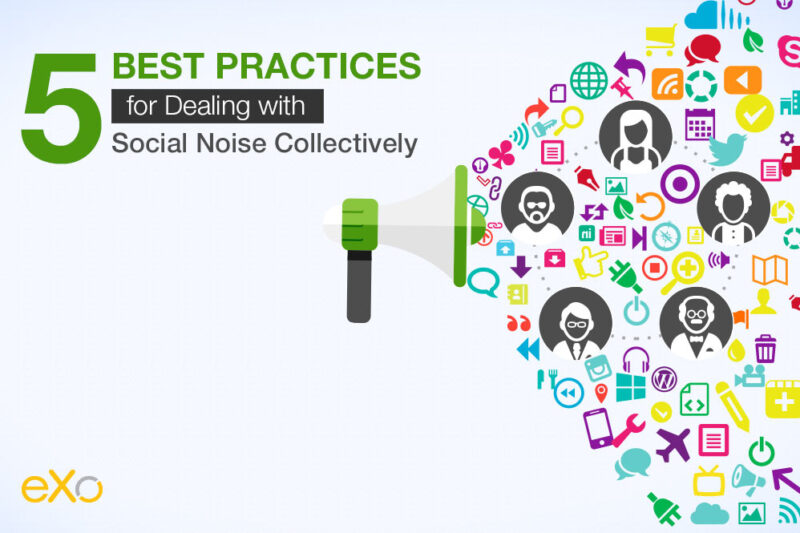- Patrice Lamarque
- October 4, 2016
5 Best Practices for Dealing with Social Noise Collectively
When we covered social noise at the workplace, we presented it as a good sign of engagement and advised you to let it be fairly unregulated until you reach a certain stage. But when social collaboration starts to take off, the intensity of the interactions can make it challenging to find the right balance between noise and signals.
What really determines how much noise collaborators will have to deal with is how loud other people are. But don’t worry—with some basic education and work ethics, anyone can form good habits to limit their social noise emissions.

Content
Here are some suggestions for adapting your behavior that should help contribute to a sane social environment.
1. Post in the right channels
It’s very tempting to share your posts with a large audience to make sure your message is seen by everyone. But by doing this, you’ll probably miss your particular audience and annoy everyone else. You must learn to carefully choose your audience. Make sure your intranet has communication channels for your teams, projects, and interests, and post your messages where most of the members will see them.
In an enterprise social network, if you’re a heavy poster and you notice that your network is shrinking, consider surveying your colleagues to see how they feel about your posts. Before your network collapses completely, you may consider posting less content for the masses and more for dedicated areas.
2. Be disciplined in your one-to-one chats
In group chat rooms, especially large ones, you must stay disciplined. Avoid mixing topics. Let others finish a point before starting another one. Avoid blasting messages with short sentences. If the conversation shifts to something that clearly concerns just you and another person, take the discussion to a private room.
On the other hand, every time you find yourself in a private discussion with one person, ask yourself if others may need to hear what you’re discussing. If it’s not something strictly between you and the other person, pause and take the discussion to a more appropriate room.
3. Consolidate knowledge
It’s so easy to ask a question in a chat in the hopes of getting a quick answer. However, because chat conversations tend to be volatile, messy, and not easily searchable, chat is not appropriate for consolidating corporate memory and knowledge. There are better tools for that, such as forums and wikis, which are more easily searchable and widely accessible.
A classic anti-pattern is doing Q&A sessions in chat rooms. It’s very tempting to use chat to get quick answers. But by doing that, you’re putting pressure on others to answer immediately. Hence, you’ll likely receive poorly-thought-out answers. Instead, if you ask questions in a forum topic, people will take more time to respond, but their answers will be better and will be stored and easily searchable in the future.
4. Respect others’ availability
When it says “Do Not Disturb”, it means ping me only if you have an absolute emergency.
It’s okay to leave a message for your colleagues when they’re offline. But avoid long monologues with mixed topics that call for answers. Instead, make a note for yourself to start a conversation when your coworker is available.
5. Mention others conscientiously
Mentions have become the de facto way of calling out to someone during a conversation. The magical @ character is so convenient for bringing someone in without effort. But just like comments and likes, mentioning someone sends him/her a notification. Indeed, it can quickly become irritating to be mentioned for anything and everything. It’s like if you shouted at me while I was busy doing something else. You would sound rude.
So think about it every time, and avoid mentioning others unless there’s a good reason to. Ask yourself: “Am I sure they’ll care? Do they actually need to take an action here?”
It’s all about social hygiene
Keeping your sanity in a busy interactive intranet is a matter of hygiene. Just like you take care of your physical hygiene for your well-being and that of others, take care of your social hygiene by constantly considering the level of noise you’re generating.
With a little discipline and good habits, I guarantee that your social intranet can remain a peaceful, productive area for everyone.
discover all the features and benefits
Related posts
- All
- eXo
- Digital workplace
- Employee engagement
- Open source
- Future of work
- Internal communication
- Collaboration
- News
- intranet
- workplace
- Knowledge management
- Employee experience
- Employee productivity
- onboarding
- Employee recognition
- Change management
- Cartoon
- Digital transformation
- Infographic
- Remote work
- Industry trends
- Product News
- Thought leadership
- Tips & Tricks
- Tutorial
- Uncategorized
Leave a Reply
( Your e-mail address will not be published)


